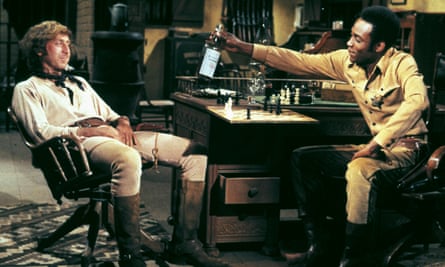T
Although it is often overlooked compared to iconic westerns like The Wild Bunch and McCabe and Mrs Miller, as well as the surge of unconventional western films that emerged in the late 1960s and early 1970s, Mel Brooks’s Blazing Saddles still manages to subvert traditional Old West narratives without the need for dreamlike Vilmos Zsigmond-esque cinematography. While it may be a comedy featuring a horse being knocked out, a Native American chief (one of three characters played by Brooks) speaking Yiddish, and even a cameo from Count Basie’s orchestra on the prairies, this lighthearted parody of Looney Tunes takes a critical stance on the harsh realities of life on the frontier from its very first scene. In a clever twist, Chinese immigrants and recently freed Black slaves are depicted as forced laborers under the brutal supervision of white men, challenging the glorified portrayal of the Wild West found in traditional westerns.
Many people argue that Blazing Saddles would not be accepted if it were released today, due to its frequent use of the N-word. However, it is worth mentioning that the film faced challenges during its release in 1974 for the same reason. In one scene, a white foreman asks Black workers to sing while working on the line, making a reference to their past as slaves. Actor Burton Gilliam, who played the foreman, was uncomfortable using the N-word and even apologized to co-star Cleavon Little. Little reminded him of the word’s negative connotation in the script. Throughout the film, the N-word is used as a hurtful insult, both in the past and present, and Little’s character serves as a clever and quick-witted figure who mocks anyone who uses it.
Little’s Bart, instead of performing a somber spiritual like “Swing Low, Sweet Chariot” or the minstrel song “Camptown Races,” surprises his men by leading them in a comically out-of-place rendition of Cole Porter’s “I Get a Kick Out of You.” This song, written in 1934, was considered modern even then and had to be altered for the movies due to its reference to cocaine. However, Bart performs this tune in 1874, poking fun at a group of racist individuals who prioritize saving their cart over the lives of Bart and another Black laborer when their pushcart gets stuck in quicksand. For Brooks, the ability to freely move between different time periods allows for more opportunities to make jokes, such as his famous line “I must have killed more men than Cecil B DeMille,” but it also highlights the fact that not much has changed in a century.
Brooks had previously tested out this bold approach with his first comedy, The Producers, which tells the story of a scheme to create a terrible musical based on a Nazi-themed fantasy called Springtime for Hitler. In Brooks’s opinion, the best way to confront evil is by laughing at it, and while Blazing Saddles may not have the same level of cleverness as The Producers, it relies on the same willingness to provoke and challenge societal norms. Brooks, along with his team of writers including Andrew Bergman (known for The In-Laws) and Richard Pryor, placed racial tension at the forefront of Blazing Saddles and used humor to diffuse it.
Blazing Saddles opens with a train needing to be redirected through the small town of Rock Ridge, which is expected to bring economic benefits for developers. In an attempt to force the residents out, the territorial attorney general (played by Harvey Korman) and his accomplice (Slim Pickens) murder the sheriff and persuade the governor (Mel Brooks) to appoint Bart, a Black man, as the new sheriff in order to showcase his progressive ideals. They believe that the townspeople will be horrified by having a Black sheriff and the town will become an easy target for attack.
The welcoming committee is taken aback when Bart enters town. They do not greet him warmly, but he finds a friend in Jim, also known as The Waco Kid. Jim is a gunslinger who has been sobering up in a jail cell. Gene Wilder plays this role with more ease and charm than his character of an anxious accountant in The Producers. Jim describes the simple people of Rock Ridge in a less-than-flattering manner, referring to them as “morons.” If Bart cannot win them over, he can easily play pranks on them.

Display the image in full-screen mode.
Together with Wilder and Korman, Brooks welcomed an integral new member to his ongoing comedic ensemble in the form of Madeline Kahn. Her portrayal of Lili Von Shtupp, a German seductress hired to lure and then leave the sheriff, evokes Marlene Dietrich with a touch of Elmer Fudd. (“I must see you in my dressing room after the show.”) Brooks penned three songs for Blazing Saddles, the most noteworthy being “I’m Tired,” a flashy burlesque number meant to entice the men, but actually serving as a lament for a sex worker exhausted by persistent admirers.
In his initial parody of the film industry, Brooks not only satirizes the western genre, but also allows himself to continuously break the established rules. He includes scenes where characters directly address the audience, such as an elderly woman who pauses her own beating to question the audience’s perception of cruelty. The film also contains jokes referencing real-life figures like Randolph Scott, Jesse Owens, and Douglas Fairbanks. In one scene, the film even jumps forward to Fairbanks’ Hollywood Walk of Fame star to ponder how he performed impressive stunts with his small feet. By the end of Blazing Saddles, Brooks has effectively blurred the line between the screen and the audience, as demonstrated by Wilder casually enjoying a box of popcorn.
Although the movie’s racial humor may be more controversial, Brooks is not someone who likes to incite unrest. He is similar to Sheriff Bart, who is able to win over a hostile audience by completely disarming them. And even though Blazing Saddles may not be able to be produced in today’s climate, it is still entertaining.
Source: theguardian.com

















